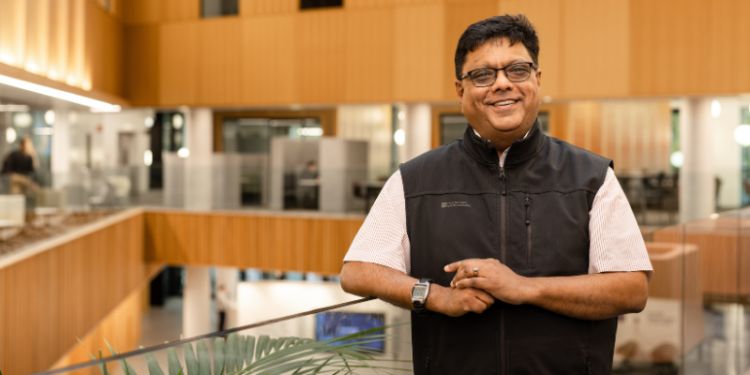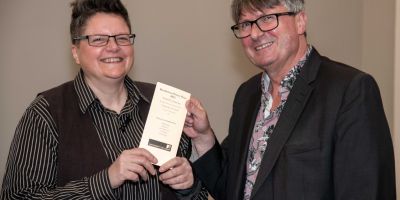Arts and humanities researchers awarded funding to unlock the impact of their research

The funding will enable the researchers to lead a broad range of impactful projects in collaboration with researchers and partners in the UK and overseas
A live adaptation of a World War II prisoner of war memoir, transformative research into subtitling processes, and a new podcast series to facilitate global health planning are among the varied research projects supported by a translational internal funding scheme at the University of Leeds.
The projects will be led by five researchers from the Faculty of Arts, Humanities and Cultures who have received funding through the second round of the Arts and Humanities Impact Acceleration Account (IAA) scheme.
Launched earlier this year and delivered by LAHRI (the Leeds Arts and Humanities Research Institute), the IAA scheme aims to support University of Leeds researchers to achieve impact through arts and humanities research and to contribute to societal, cultural and economic benefits to people and organisations outside academia.
The funding will enable the researchers to lead a broad range of impactful projects in collaboration with researchers and partners in the UK and overseas.
From Lab to Screen: A Response to AI’s Threat to the Media Localisation Industry
Dr Sara Ramos Pinto at the School of Languages, Cultures and Societies will lead a project that aims to bridge academic research with industry practice by exploring how data collected by viewer reception studies can be translated for non-academic stakeholders to improve industry subtitling standards.

Dr Sara Ramos Pinto
As media localisation companies face increasing pressure to use automated processes, subtitling quality and audience satisfaction are at risk. Dr Ramos Pinto’s research will provide localisation companies with easy-to-use industry reports to help professionals implement the latest research in their workflows and advocate for high-quality human subtitling to clients.
“The demand for automated solutions in media localisation often overlooks the impact of lower quality subtitling on the audience’s level of enjoyment and ability to understand what they watch,” Dr Ramos Pinto explained. “This project will allow us to demonstrate the unique value human subtitlers bring to the experience and help industry partners make more informed decisions about subtitle quality and audience needs.”
Dr Ramos Pinto will collaborate with a team of experts, including Carol O’Sullivan from the University of Bristol, Ola Koitla from IYUNO, Sonali Joshi from Day for Night, and Renato Barcelos (the Association of Audiovisual Translators).
History for Policy: Global Health Histories Podcasts
Shane Doyle, Professor of African History at the School of History, will collaborate with Professor Sanjoy Bhattacharya (Head of the School of History) and Sri Lanka’s Ministry of Health, on a new Global Health Histories podcast series, which will draw on Leeds’ medical historians’ expertise to provide a resource for global health planning and communication. Each podcast will connect a historical case study to a current health problem, analysing complexities, challenges, and successes from the past. The series will work towards being integrated within training programmes within the World Health Organisation and health ministries, with the aim of enhancing partners’ ability to develop, advocate for and implement inclusive policy and projects.

Professor Shane Doyle
Professor Doyle said: “We are delighted to have received this IAA award as it will enable us to engage with new audiences as we draw out connections between historical case studies and current health problems. What is really exciting is the opportunity to build on existing relationships with Sri Lanka’s Ministry of Health. This funding means that we can work with our Sri Lankan partners in developing new training programmes in health diplomacy and inclusive policy, and in helping to make medical science comprehensible to the public.”
Professor Sanjoy Bhattacharya, Head of the School of History, added: “Based on long-standing collaborations with the Sri Lankan Health Ministry, this work will develop a strong partnership with the country's Medical Research Institute. Its Director, Dr Suranga Dolamulla, will draw in different arms of the Sri Lankan government, at all its levels, as historical insight is translated into work that will strengthen policy design, implementation, and evaluation. This partnership between the University of Leeds and the Sri Lankan government will also draw in WHO collaboration from all its levels, further fortifying another existing, strong link between the School of History at the University of Leeds and the United Nations' specialist global health agency.”

Professor Sanjoy Bhattacharya
International Collaboration for Enhancing Patient Advocacy and Healthcare Communication
Led by Dr Jieun Kim in the School of Languages, Cultures and Societies, this project will seek to strengthen international collaboration in patient advocacy and healthcare communication and promote knowledge exchange and support for blood patients between the UK and Korea. Key activities include international exchanges around a blood exhibition and the creation of a translator and cultural liaison corps at the University of Leeds.

Dr Jieun Kim
It will build on Dr Kim’s AHRC Fellowship, ‘Hematopolitics: Blood Donation and Contested Belonging in East Asia’ – exhibited at a recent AHRC-supported Research Showcase organised by LAHRI – and bring together a range of experts from diverse fields and organisations. These include Thackray Museum of Medicine, the Korea Leukemia Patients Organization and Blood Cancer UK.
Dr Kim said: “I’m really excited to receive this award as it opens new opportunities for impactful work in blood patient advocacy. While my research and engagement have focused on blood donation awareness, this IAA funding allows for meaningful strides in directly supporting those affected. The timing is ideal, offering a platform for public engagement, knowledge exchange, and solidarity-building: it supports the Korea Leukemia Patients Organisation as it expands to provide comprehensive support for patients with various types of blood cancer in Korea, the Thackray Museum of Medicine as it extends its reach with a special exhibition on blood donation, and Blood Cancer UK as it strengthens connections with East Asian communities. We're truly grateful for this support and excited for what’s ahead.”
Memoirs of POW Experience: Enhancing Public Understanding of Diversity in, and the Functionalities of, Military Life Writing Through Performance
Professor Christiana Gregoriou, a stylistician and English Language specialist at the School of English, is undertaking research into WWII memoirs, one of which is her grandfather's account of his POW experiences as a Cypriot sergeant in the British Army’s Cyprus Regiment. Christiana is collaborating with Professor George Rodosthenous from the School of Performance and Cultural Industries, a specialist in theatre directing and verbatim adaptation, who will direct the adaptation of the memoir. This adaptation will be presented as a lecture performance, touring heritage sites across Yorkshire in May 2025 to mark the 80th anniversary of VE Day. Professors Gregoriou and Rodosthenous will work alongside Eden Camp Modern History Museum, the Royal Armouries, and the Second World War Experience Centre.

Professor Christiana Gregoriou
Professors Gregoriou and Rodosthenous said: “We are delighted with this award and look forward to engaging with war museums’ visitors, which include year 6 primary school students on school-visits. We hope to raise awareness of the British Army’s WW2 veteran community’s diversity and demonstrate how memoirs both record and reconstitute subjective experiences of war. Our project’s legacy will include a recording of the performance to accompany learning resources for specialised educational platforms."

Professor George Rodosthenous
Co-creating Dialect Research Outputs with Public Users
Professor Fiona Douglas from the School of English, alongside her school colleagues Kathleen McGrath and Dr Kerri-Ann Butcher and Fiona Rosher at the Dales Countryside Museum (DCM), will lead a project to develop accessible, impactful dialect research outputs co-created with public users.

Professor Fiona Douglas
The project builds on the Dialect and Heritage Project (DHP), which has already connected with public audiences through initiatives like the Great Big Dialect Hunt, oral histories and volunteering opportunities. Now, Professor Douglas and her team are taking this engagement further by collaborating with community members to shape the final research outputs for maximum relevance and impact.
The team will run four engagement workshops at DCM to co-design research outputs for diverse audiences in schools, libraries, and museums. They will explore the effectiveness, appeal and reach of different formats, including digital stories, interactive data visualisations and self-guided exploratory activities.
Professor Douglas said: “We are delighted to have received this funding to build on the outreach work of the Dialect and Heritage Project. As researchers, we often assume that we ‘know best’ when it comes to communicating our research findings and interpreting them for public audiences, but do we? We make assumptions but seldom ask the people we are trying to communicate with whether what we are providing is what they need, want or value. This funding will enable us to properly listen to our audiences - schools, museum and library visitors, different age groups - and to co-create outputs that are meaningful and impactful.”
Professor Julia Snell, Impact Accelerator Account Panel Chair, said:
“It was a privilege to chair the Impact Accelerator Account review panel and gain insight into the diverse ways in which researchers in our Faculty are working with community groups, museums, charities and commercial partners to bring about positive change. The scheme opens up opportunities for researchers to extend the scope of their work and make a real difference beyond the University.”
Alix Brodie-Wray, Faculty Impact Development Manager: Arts, Humanities and Cultures, said:
“We are thrilled to see the continued success of the Impact Accelerator Account awards in their second round. We received a wide range of high-quality submissions from a variety of researchers at different schools, which highlights the University of Leeds' interdisciplinary spirit and the diverse and impactful research taking place across campus."
Ruth Rayner, Translational Research Portfolio Manager at Research and Innovation Service, said:
“These Impact Accelerator Account grants are a testament to the Research and Innovation Service's commitment to empowering innovative research that drives meaningful change. With this flexible funding, we’re enabling a talented group of researchers to explore ambitious ideas, build impactful partnerships, and engage more deeply with communities, ensuring their work has tangible benefits for society.”
Academic staff at the University of Leeds can find more information about the Impact Accelerator Account scheme on the Leeds Arts and Humanities Research Institute SharePoint: IAA (AHC) Guidance and Application.




